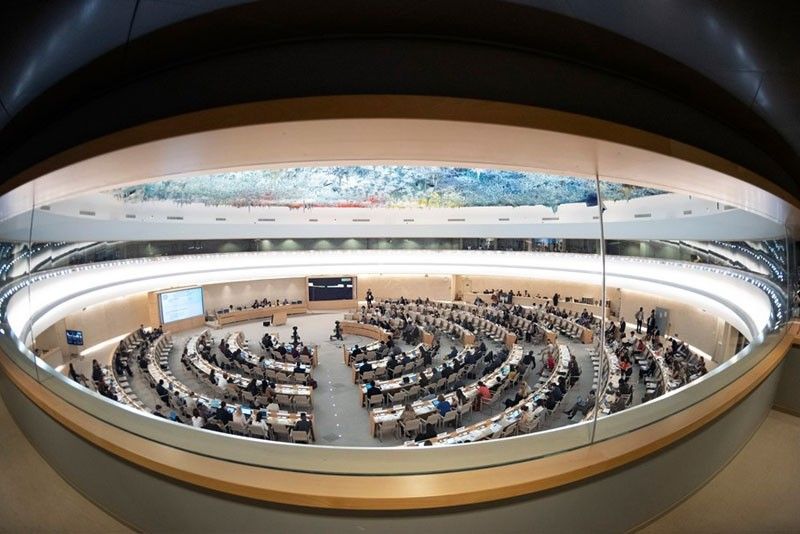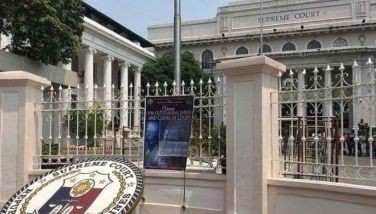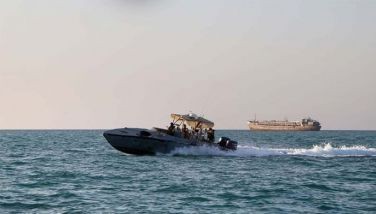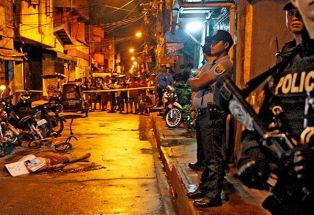Palace hits interference by UN rights experts

MANILA, Philippines — Malacañang yesterday rejected a call for an independent United Nations probe into the alleged human rights violations in the Philippines, saying it “smacks of unpardonable intrusions on our sovereignty.”
UN rights experts asked the UN Human Rights Council on Friday to look into the “staggering number of unlawful deaths and police killings in the context of the so-called war on drugs, as well as killings of human rights defenders.”
President Duterte has overseen a narcotics crackdown in which police have killed more than 5,300 suspected drug offenders since he was elected three years ago.
Rights groups say the actual number of dead is at least three times higher.
“The latest call by 11 special rapporteurs of the United Nations for an international probe of the Philippines not only is intellectually challenged but an outrageous interference on Philippine sovereignty,” presidential spokesman Salvador Panelo said.
Panelo accused the 11 UN experts of peddling “a biased and absolutely false recital of facts, adulterated with malicious imputations against the constituted authorities, smacks of unpardonable intrusions on our sovereignty.”
Panelo challenged the UN rapporteurs, calling them as propagandists.
“Lest these foreign propagandists, masquerading as human right protectors, forget, allegations are not proof. One or two of them have tried this tact using some gullible if not biased local and foreign media sowing the seeds of negative force and perpetuating them,” he said.
“They used the art of continuing miscommunication to clothe them with believability.”
Panelo stressed there is no way that the UN rapporteurs could conduct any inquiry because it is based on “false information” peddled by the political opposition, whose candidates lost in the recently-concluded midterm elections.
“The reasons foisted by them for the aforesaid investigation have been discredited and repudiated by the very nation they pretend to care about,” Panelo said.
“Those who have spoken against the campaign on illegal drugs and human rights record of this President have been overwhelmingly rejected by the Filipino electorate,” he said.
Last month’s midterm polls, held halfway into Duterte’s six-year term, saw his allies take control of both the Senate and the House of Representatives.
The overwhelming support to the candidates backed by the President during the May elections also proved the critics wrong, Panelo added.
“The Filipino people have spoken anew, via the just concluded elections. Those who have spoken against the campaign on illegal drugs and human rights record of this President have been overwhelmingly rejected by the Filipino electorate,” Panelo said.
“They have been resoundingly beaten in the polls. These special rapporteurs should by this time realize that they, who believed in the untruthful advocacies of the electorally vanquished pretenders, have likewise been demolished, beyond redemption,” he added.
Long overdue
International rights advocates, on the other hand, said a probe into summary killings and other violations in the Philippines is long overdue.
The UN human rights experts cited the “staggering number” of unlawful killings in the Philippines that included human rights defenders.
“It is incumbent on Human Rights Council members and observers to work together at the upcoming 41st session to ensure an investigation is finally put in place,” said Laila Matar, deputy director of Human Rights Watch.
The 11 UN experts, who are independent and do not speak for the UN, include the special rapporteur on summary or extrajudicial killings, Agnes Callamard.
Callamard earned Duterte’s ire when she called for a stop to the drug war killings in 2016.
Matar said this collective expression of concern and call to action made by 11 top UN experts only further highlights the responsibility of the Human Rights Council to address the situation in the Philippines.
“At the March session of the Council this year, High Commissioner (Michelle) Bachelet made strong remarks on the Philippines, noting estimates of up to 27,000 extrajudicial killings and noting that only one case had been subject to investigation and prosecution,” Matar said.
Duterte’s drug war is his signature policy initiative and he defends it fiercely, especially from international critics and institutions, which he said do not care about the Philippines.
Critics have alleged the crackdown amounts to a war on the poor that feeds an undercurrent of impunity and lawlessness in the country.
Violence against criminals
President Duterte fought back, saying Western governments also kill their own violent criminals.
Duterte said those who set conditions on the Philippines in relation to defense agreements should rethink their positions.
He also raised questions on Canada and the United States, on whether they use violence against their own criminals.
“You know in America, in Canada, everywhere, you don’t kill your violent criminals? You do,” Duterte said in an interview with the Sonshine Media led by evangelist Apollo Quiboloy in Davao City past midnight yesterday.
“Me, I have citizens who are cutting the heads of foreigners and Filipinos and everybody. I have a group here fighting to overthrow this government by force. And you say, ‘You cannot use it against your own citizens’,” he said, referring to the Marawi siege by extremists in 2017.
Duterte illustrated why he had decided to pivot to China from the US at the start of his term. He said he was piqued that the US and Canada placed conditions on sales of firearms and helicopters, such as not using them on its own citizens, which prompted the Philippines to cancel procurements from the two countries.
Duterte explained he needed to boost the defense capability of the Armed Forces of the Philippines to address terrorism as early as 2016.
At the start of his administration, Duterte also lashed out at former US president Barack Obama, whose advisers have raised concerns on human rights in the bloody drug war.
To serve and protect
Duterte is subscribing to the higher call of protecting the general welfare of the greater majority of Filipinos, Panelo said.
“The Philippines is a working vibrant democracy in this part of the world. It has demonstrated strength and resilience in exercising the democratic rights outlined by the Constitution through the various institutions, with their respective allocation of power, geared toward the promotion of general welfare,” he said.
Panelo also warned critics that the Duterte administration will not be dragged into the narration of falsehoods.
“Let the enemies of the state and their supporters from foreign soil be forewarned that no amount of destructive narratives against this government will envelope it with the appearance of pretended truth to hoodwink the Filipino people in embracing it,” he said.
Panelo said Duterte still enjoys high trust and approval ratings in the surveys despite the negative publicity generated by critics. – With Rhodina Villanueva, Romina Cabrera, AFP
- Latest
- Trending


























